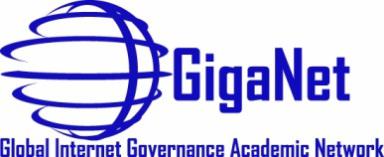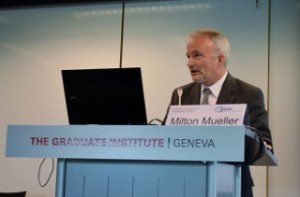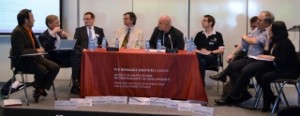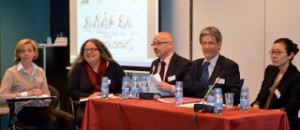Workshop Report: Global Governance of the Internet

The workshop on “The Global Governance of the Internet: Intergovernmentalism, Multistakeholderism and Networks”, jointly organized by two ISOC-CH members, Roxana Radu and Jean-Marie Chenou, in association with the Programme for the Study of International Governance of the Graduate Institute of International and Development Studies and the Global Internet Governance Academic Network (GigaNet), was held on May 17-18, 2013 at the Graduate Institute in Geneva. It brought together Internet Governance scholars and stakeholders to reflect on current governance practices in this emerging field, their limitations and challenges and potential models for the future. The event built on the proximity of ITU’s World Technology Policy Forum and the Multistakeholder Advisory Group (MAG) consultations for the 2013 Internet Governance Forum (IGF) and took stock of the state of the art of social science research on global Internet policy-making. Its broader theme linked back to the 2012 World Conference on International Telecommunications (WCIT) conference in Dubai, and examined the role and relevance of intergovernmental organizations in Internet governance, while proposing a series of debates on the promises and limitations of multistakeholderism.
Following the welcome remarks by Thomas J. Biersteker (Graduate Institute) and Milton Mueller (GigaNet), two round-tables addressed the issues of the role of intergovernmental organizations and networks in Internet governance and the future of the multistakeholder governance model. Participants to these round-tables included: Wolfgang Kleinwächter (University of Aarhus), Ian Brown (Oxford Internet Institute), William J. Drake (University of Zürich), Richard Hill (Association for Proper Internet Governance), Xianhong Hu (UNESCO), James Lawson (Council of Europe), Eliot Lear (Cisco Systems), Jeremy Malcolm (Consumers International), Rolf H. Weber (University of Zürich), Constance Bommelaer (Internet Society), Jovan Kurbalija (DiploFoundation), Wolf Ludwig (Digital Allmend, EURALO, EURODIG), Meryem Marzouki (CNRS & UPMC Sorbonne Universités), YJ Park (SUNYKorea), and Werner Staub (CORE).
Three keynotes included Milton Mueller’s (Syracuse University) presentation on the Cold War Metaphor in Internet Governance, David Sylvan’s (Graduate Institute) address on “Governance without governors” and Ian Brown’s (Oxford Internet Institute) presentation on intergovernmentalism and Internet security.

The second day featured nine academic papers presented by: Richard Hill (Hill & Associates), Michèle Rioux (IBEI/UQAM & CEIM), Andreas Kuehn (Syracuse University), Rolf H. Weber (University of Zürich), Ewan Sutherland (LINK Centre), Anne-Claire Jamart (Cornell Law School), Gianluigi Negro (Università della Svizzera Italiana), Andreas Schmidt (Delft University of Technology), and Xianhong Hu (UNESCO).

The rich exchanges during the workshop clustered around several cross-cutting themes.
First, the implementations and the limitations of multistakeholderism in Internet governance were discussed, both during the round-tables and during the academic presentations. Multistakeholderism seems to have been embraced by Intergovernmental Organizations (IGOs) as well as by states. Representatives of IGOs explained how multistakeholder processes were increasingly implemented in their organizations. It was also mentioned that during the World Telecommunication Policy Forum held in Geneva prior to the workshop, even previously reluctant states had referred to multistakeholderism as a key principle of Internet governance. However, the generalization of multistakeholderism also evidences some limitations. The definition of the concept is not clear and the interpretation of the Tunis Agenda of 2005 was debated, notably the role of IGOs as stakeholders. The limited and unequal participation in multistakeholder processes was stressed. The lack of transparency might also lead to problems of legitimacy or even corruption. Finally, cultural differences undermine the universality of multistakeholderism.
Second, multiple tensions in Internet governance were acknowledged by the participants. While the Cold War metaphor was criticized, the policies of great powers such as the U.S and China might lead to more frequent occurrence of power politics in Internet governance. The 2012 World Conference on International Telecommunications signaled a split between signatories and non-signatories of the new International Telecommunication Regulations, providing evidence of dissenting state positions towards regulating aspects of the Internet at the global level. However, this divide might have been exaggerated by media coverage and initial reactions as construed along democratic regime lines.

Finally, the future of Internet governance and the need to overcome existing tensions were also a recurrent theme during the workshop. While tensions exist, international cooperation is increasing in the field; and IGOs are evolving in order to play a key role in this regard. Some participants advocated for an improved and enhanced multistakeholderism. Others explored new principles that could strengthen multistakeholderism, such as Internet freedom and Internet universality. It was also acknowledged that these principles have limitations as well. The need for new ideas, new principles, and even a new social contract in Internet governance were stressed.
Thus, the workshop offered an opportunity to reflect on crucial issues of Internet governance, in a period of vivid policy debates. The quality of the contributions illustrated the abundance of emerging ideas on Internet governance and foreshadowed the richness of future policy debates and scholarly research.
Reported by:
Roxana Radu
PhD Candidate in International Relations/Political Science
Graduate Institute of International and Development Studies
Geneva – Switzerland
